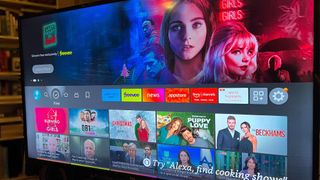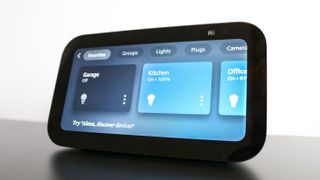Amazon set to ditch Android in ‘all devices’ — it's starting with Fire TV and Echo Show
Amazon is reportedly developing an all-new operating system

Amazon is reportedly developing a new operating system to power its ever-growing hardware portfolio. At present, the company uses its Fire OS, a fork of open source Android that sits inside the likes of the Fire TV Stick 4K Max, Fire Tablet series and Echo Show speakers. But that could be about to change.
Various sources are claiming Amazon is building its own OS codenamed "Vega" that'll help it move away from Android for its upcoming products. A report in LowPass, claims it's in the advanced stages of development, while Zatznotfunny suggests it's already here. In the former case, Amazon is testing it on Fire TV streaming sticks while the latter has seen it running on a 3rd generation Echo Show 5.
What we do know is that Vega OS will be a “more web-forward application model” and take its foundation directly from Linux rather than forking from Android (which itself is Linux-based).
On the Echo Show example, the on-screen information clearly shows the software being reset with naming and numbering reset to generic ‘OS 1.1’. And a further clue is the fact the OS 1.1 Echo Show no longer runs Netflix.
The reason for this (pretty big) change for Amazon? We’re not entirely sure but we can make some educated guesses. LowPass cites industry insiders claiming Amazon’s plan is to reach “hundreds of millions of eyeballs on a wide range of inexpensive devices” and, from there, “monetize those eyeballs with ads and services”.

While using open source Android for years has allowed Amazon a level of customization without jeopardising Android app compatibility, it does come with some drawbacks. Notably, the fact that Amazon’s reliance on the Android Open Source Project means it can’t keep up with Google’s in-house Android advancements.
That can be a problem when the two companies compete in hardware spaces like the best smart displays and the best Android tablets. For example, the Fire OS 7 version powering many current Amazon devices is based on Android 9 from 2018. Whereas the Google Pixel Tablet has come right out the gate on Android 14.
Sign up to get the BEST of Tom’s Guide direct to your inbox.
Upgrade your life with a daily dose of the biggest tech news, lifestyle hacks and our curated analysis. Be the first to know about cutting-edge gadgets and the hottest deals.
And if Amazon plans to extend into more hardware categories (the report mentioned in-car entertainment systems) then having a new OS built from the ground up could give Amazon far more flexibility when to implement the aforementioned monetization ideas.
Meanwhile, it seems like Amazon has also instructed app developers to switch to using Meta’s React Native as the framework for building apps for its hardware — doing so also enables those apps to work on a wide range of operating systems that include iOS and Android.
What’s more, because of its history as a mobile OS, Android’s code comes with a lot of baggage that’s not needed for running on low-cost smart home hardware. The result is a decrease in performance that wouldn’t be the case with a freshly-built “web-first” OS.
Last, but not least, moving away from Android would allow Amazon to untangle itself even further from dealings with Google and could lead to the retailer forging new and more profitable partnerships with other hardware vendors.
More from Tom's Guide

Jeff is UK Editor-in-Chief for Tom’s Guide looking after the day-to-day output of the site’s British contingent. Rising early and heading straight for the coffee machine, Jeff loves nothing more than dialling into the zeitgeist of the day’s tech news.
A tech journalist for over a decade, he’s travelled the world testing any gadget he can get his hands on. Jeff has a keen interest in fitness and wearables as well as the latest tablets and laptops. A lapsed gamer, he fondly remembers the days when problems were solved by taking out the cartridge and blowing away the dust.
